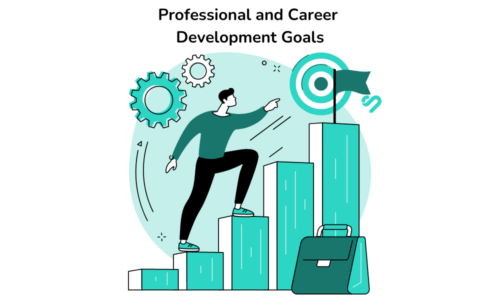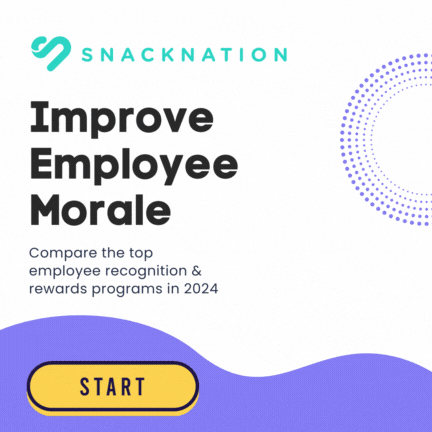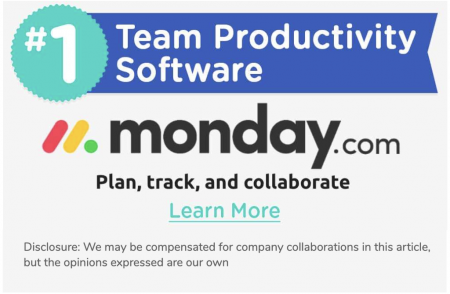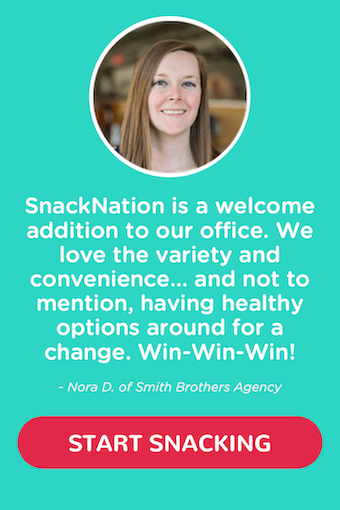Feeling stuck in your personal or professional life?
Then it’s time to whip out those SMART goals.
These bad boys (specific, achievable, measurable, relevant, and time-bound) will help keep you motivated, productive, and on track to achieving your full potential.
Not only will setting goals give you something to strive for, but regularly reviewing and adjusting them will make sure you’re always heading in the right direction, no matter how many curveballs life throws your way.
So don’t just sit there — start setting those goals and watch yourself soar!
Page Contents (Click To Jump)
What are Professional and Career Development Goals?
Professional and career development goals are targets individuals set for themselves to advance their careers and grow as professionals.
These can include short-term goals, like finishing a certification or making connections with industry bigwigs, or long-term career goals, like earning that promotion you’ve been working hard for, or starting your own business.
Not only will working towards these goals help you achieve your career aspirations, but it’ll also give you the chance to build new skills and stay fired up about your work.
🔥 Tip from The Assist: Break large goals into smaller milestones to make them more manageable and celebrate small wins along the way.
Why is Setting Professional Development Goals Important?
It’s natural to want to stay within your comfort zone, but doing so can leave you feeling unfulfilled and directionless, and may even lead you to feel unsatisfied at work.
By setting clear career goals, you are forced to think deeply about what you truly want and make more intentional choices about your career path.
Plus, having defined goals gives you purpose and direction since you’re working towards milestones that align with your values and aspirations — your “why”.
🔥 Tip from The Assist: Align goals to your organization’s objectives and metrics to get buy-in and make the most business impact.
How to Set Professional Development Goals
1. Decide your end goal 🏁
Think about where you want to be in the long run. What are your career aspirations? What skills do you want to acquire? What do you want to be known for? By having a clear end goal in mind, you’ll be able to make more informed decisions and set targeted goals to help you get there.
2. Reference your most recent performance review 📖
Your performance review isn’t just a time for your boss to tell you what you’re doing wrong – it’s also a goldmine of information for identifying areas for improvement and setting goals. So take a look at the feedback and areas for growth highlighted in your review, and use them to set your goals.
3. Set SMART Goals ✅
SMART goals are Specific, Measurable, Attainable, Relevant, and Time-bound. Using this framework can help you set goals that are clear, achievable, and aligned with your long-term goals.
4. Break your larger goals into smaller tasks ✂️
It can be overwhelming to tackle a large goal all at once. Break your larger goals into smaller, more manageable tasks so you don’t become overwhelmed and stay on track.
5. Regularly review your progress 📈
Regularly reviewing your progress will help you stay on top of deadlines and make necessary adjustments to your goals. Plus, it’ll keep you motivated and feeling good about your progress.
🔥 Tip from The Assist: Partner with a peer or mentor who can hold you accountable to your goals and provide objective guidance.
Examples of Career Development Goals
1. Find a better work-life balance ⚖️
A broad goal could be setting boundaries between work life and personal life. However, it could also be setting screen-time limits to encourage breaks.
2. Obtain a new certification or degree 🧑🎓
This could be a professional certification or a higher education degree, such as a bachelor’s degree, master’s degree, or doctoral degree.
3. Boost your time management skills ⏰
Try out a time-blocking or set dedicated focus times in your day to uninterrupted work time to complete necessary tasks.
4. Improve your communication skills in the workplace 🗣️
This could mean trying a new team communication tool, working on your presentation skills for more efficient team meetings, or learning how to give better constructive feedback.
5. Grow your professional circle 🤝
Building relationships with other professionals in your field can help you learn from the best, expand your knowledge base, and open up a whole world of new opportunities.
6. Seek out new challenges and responsibilities ✅
Not only does taking on new challenges and responsibilities help you grow as a professional, but it’s also an effective way to demonstrate your potential for advancement.
7. Learn a brand new skill ⭐
This could be a technical skill, such as programming or data analysis, or a soft skill, such as communication or leadership skills. Level up by taking an online course or in-person class to help you learn this new skill in a set time frame.
8. Amplify your professional presence 🤗
This could include public speaking at an event or conference, writing engaging LinkedIn posts, or building your online presence through a killer website or social media profiles.
9. Get promoted 💵
Earning a career advancement can be a challenging process, but getting one is certainly rewarding.
10. Volunteer or participate in community service 👏
Volunteering or participating in community service can help you build new skills, make connections, and give back to your community. It’s also a great way to build stronger bonds with your team members by getting out of the office and giving back.
Common Mistakes Made When Setting Professional and Career Development Goals
Having clearly defined professional development goals is crucial for career success and satisfaction. However, many people make mistakes that sabotage their chances of accomplishing their objectives. Here are some common pitfalls to avoid as you map out impactful career goals:
❌ Vague goals like “get promoted” or “be a leader” are impossible to measure. Break bigger objectives down into incremental steps complete with timeframes. Perhaps “get promoted” becomes “complete leadership training and get promoted to team manager within 18 months.”
❌ Examine your strengths, weaknesses, and values before setting goals. Understanding your skills and passions will help identify fulfilling and realistic aims. List out priority areas for improvement as well.
❌ Collaborate with your manager, mentor, or career coach when shaping goals. They can impartially evaluate which goals align with your capabilities and growth opportunities. Receiving input early prevents going down the wrong path.
❌ Focus your efforts on measurable growth, not just end results. Improving skills, knowledge, behaviors, and mindsets are stepping stones to reaching targets.
❌ Set up regular check-ins to review your timeline and progress. Adapt goals as needed based on changing priorities. Life happens – an iterative approach prevents rigidity.
❌ Celebrate incremental achievements with small rewards to maintain motivation. Each step forward brings you closer to your larger objectives.
With intention and organization, you can establish career goals that align with your aspirations while avoiding common missteps. Define objectives thoughtfully, measure progress consistently, and show yourself some grace as you grow.
Join the Jobs Reddit Community
How to answer “where do you see yourself in five years”?
byu/first2fall injobs
The r/Jobs community on Reddit delivers an immense knowledge base for those looking to set and accomplish career goals. By participating in discussions, you can discover best practices for crafting a fulfilling yet realistic career roadmap.
Fellow community members will provide tips on mapping your skills to roles, weighing options across industries, and pursuing advancement. You can ask targeted questions to get feedback on handling workplace challenges related to your goals from those with relevant experience. The collective wisdom from the community will help you anticipate potential pitfalls and fine-tune your approach.
Whether you need interview advice, salary negotiation tactics, or simply encouragement, the supportive r/Jobs thread has your back. Tapping into this career-minded group can provide the perspective, knowledge, and accountability needed to manifest your professional goals.
Check out r/Jobs on Reddit to learn more!
People Also Ask These Questions About Professional Development and Career Development Goals
Q: What are the five areas of professional development?
- A: The 5 areas of professional development are: building a knowledge base, observing models, reflecting on your practice, changing your practice, and gaining and sharing expertise. However, if you are looking for professional development tips for women, look no further!
Q: When should I start setting professional and career development goals?
- A: It’s never too early or too late to start setting professional and career development goals. Some people prefer to set goals at the beginning of a new year, while others find it helpful to set goals at the start of a new project or phase in their careers. Ultimately, it’s up to you to determine the best timing to set the specific goals you are working towards.
Q: Where should I keep track of professional and career development goals?
- A: There are several ways to keep track of professional and career development goals. Some people prefer to jot them down in a planner or journal, while others find it more convenient to record them digitally in a spreadsheet or project management software. You should choose a method that works best for you and your needs.
Q: How do I determine my goals?
- A: Look at your professional life — where you are now and where you want to go. From there, you should be able to come up with a broad goal roadmap. Take your big goals and break them down into smaller tasks you can accomplish weekly, monthly, yearly, etc.














